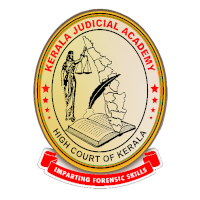INDUCTION COURSE FOR THE NEW RECRUITS
Induction training for Munsiff/Magistrates (Civil Judges (Junior Division))
Objectives of the Induction Course:
To prepare newly appointed judges for performing their duties and functions;
To ensure uniformity and predictability of decisions by equipping the judges with adequate command of laws, procedures and the technology of judging;
To educate judges on related areas of knowledge and skills useful for judicial work;
To inculcate the right kind of values, attitudes and perspectives desirable for undertaking judicial functions;
To motivate and prepare for absorbing reformist initiatives, overcome resistance to change and to manage change in a manner beneficial to judicial administration;
To recognize problems confronting the judiciary or problems faced by people vis-a-vis the judicial system and help develop and administer solutions for better access to justice.
Scheme of Training
PHASE- I (Initiation)
Place Duration Nature of Training
Academy Three Months Theoretical Training-I
Civil Courts Two Months Practical Training
Criminal Courts One Month Practical Training
PHASE- II (Exploration)
Including training at various Depts Three Months Theoretical Training-II
Civil Courts One Month Practical Training
Criminal Courts One Month Practical Training
PHASE -III (Reflection)
Academy One Month Remedial teaching & Evaluation
Total Twelve Months
Institutional Training at the Kerala Judicial Academy
Institutional training at the Academy lasts for 7 months. Hence, traditional approach towards the topics is not followed here. Trainees no longer be passive listeners, they must be active participants in gathering knowledge. Teaching should be student oriented rather than teachers centered. As many instructional techniques as possible are being introduced for teaching various topics. As per the above scheme, training at the Kerala Judicial Academy is divided into three phases and training in each phase is designed with well defined objectives:
Phase - I (Initiation)
This phase focuses on promoting legal ability in substantive laws, procedural laws, special statutes, etc. Trainees acquire knowledge in all branches of law and in their application in various factual situations.
Phase - II (Exploration)
In this phase, training aims at personality development, teaching of management skills and, Judicial Conduct and standards, and at improving awareness on contemporary and inter-disciplinary issues in order to improve their competence and working skill for better discharge of their judicial and administrative duties.
Phase - III (Reflection)
Evaluation of the trainees by questionnaire discussion, Judgment writing on civil and criminal cases, etc. Remedial measures, if necessary, is taken at appropriate stages.
